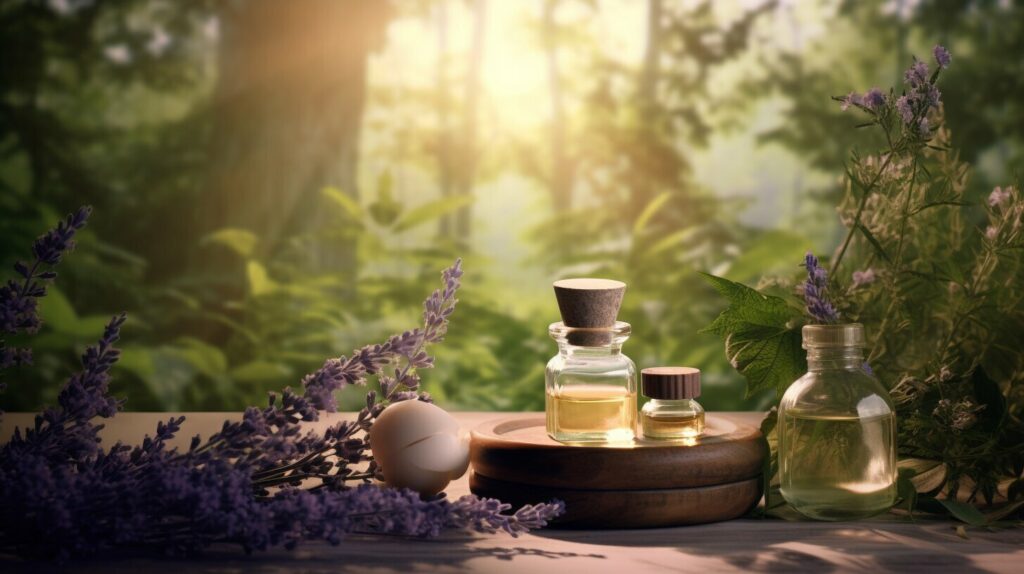Welcome to the world of aromatherapy, where you can discover the power of essential oils for stress relief and natural well-being. In today’s fast-paced and hectic world, finding moments of peace and tranquility is essential for maintaining a healthy mind and body. With aromatherapy, you can indulge in the soothing scents of nature and experience the profound benefits they offer.
Aromatherapy is a holistic practice that involves inhaling or smelling essential oils to promote wellness and reduce stress. These oils, extracted from plants, contain potent properties that can uplift the spirit, calm the mind, and rejuvenate the body. Whether you’re seeking relaxation, relief from anxiety, or a way to enhance your overall well-being, aromatherapy can be your trusted companion.
Essential oils for stress relief are known for their remarkable abilities to soothe the mind and body. Popular choices include rosemary, lavender, and ylang-ylang. These oils are renowned for their calming and relaxing effects, helping to melt away stress and tension. With various methods such as aroma sticks, diffusers, or body creams, you can easily incorporate aromatherapy into your daily routine.
However, it’s important to approach aromatherapy with caution and follow safety guidelines. Before using essential oils, it is recommended to consult with a healthcare professional, especially if you have any pre-existing health conditions. By doing so, you can ensure a safe and beneficial experience with aromatherapy stress relief.
Key Takeaways:
- Aromatherapy is a holistic practice that uses essential oils for stress relief and promotes wellness.
- Popular essential oils for stress relief include rosemary, lavender, and ylang-ylang.
- Using aroma sticks, diffusers, or body creams are effective ways to engage in aromatherapy.
- Consult with a healthcare professional before using essential oils, especially if you have pre-existing health conditions.
- Experience the benefits of aromatherapy stress relief and embrace serenity in your daily life.
Understanding the Benefits of Aromatherapy for Stress Relief
Aromatherapy has gained popularity as a natural and effective way to reduce stress and promote relaxation. By harnessing the power of essential oils, aromatherapy can provide a holistic approach to managing stress and improving overall well-being. Here are some key benefits of aromatherapy for stress relief:
1. Emotional and Mental Calmness
One of the primary benefits of aromatherapy is its ability to induce a sense of calm and relaxation. When you inhale essential oils, their aromatic compounds interact with the emotional center of the brain, triggering the release of endorphins and promoting a state of mental tranquility. This can help alleviate stress, anxiety, and even mild depression. Some essential oils known for their calming properties include lavender, chamomile, and bergamot.
2. Alleviation of Physical Symptoms
Stress can manifest itself in various physical symptoms such as headaches, muscle tension, and digestive issues. Aromatherapy can help alleviate these symptoms by targeting the underlying causes of stress. For example, peppermint oil has analgesic properties that can soothe headaches, while ginger oil can aid digestion and relieve stomach discomfort. By addressing both the physical and emotional aspects of stress, aromatherapy provides a comprehensive approach to stress relief.
3. Improvement in Sleep Quality
Stress often disrupts sleep patterns, leading to insomnia or restless nights. Aromatherapy can help improve sleep quality by promoting relaxation and creating a peaceful environment. Essential oils like lavender and chamomile have sedative effects that can help calm the mind and prepare the body for sleep. By incorporating aromatherapy into your bedtime routine, you can create a soothing atmosphere that promotes restful sleep.
These are just a few of the many benefits that aromatherapy can offer for stress relief. The key is to find the right essential oils that resonate with your individual needs and preferences. Whether you prefer the floral scent of rose or the invigorating aroma of eucalyptus, experimenting with different essential oils can help you discover the ones that work best for you. Remember to always use high-quality essential oils and consult with a healthcare professional if you have any concerns or pre-existing health conditions. Embrace the power of aromatherapy and embark on a journey towards a calmer and more relaxed mind and body.

Exploring Essential Oils for Stress Relief
Aromatherapy is a powerful tool for calming the mind and reducing anxiety. By incorporating essential oils into your daily routine, you can experience the soothing benefits of aromatherapy for stress relief. Here are some essential oils that are known for their calming properties:
- Rosemary: Known for its pain-relieving, anti-inflammatory, and memory-boosting properties. Rosemary essential oil can help alleviate stress and anxiety.
- Lavender: Widely recognized for its ability to promote relaxation and improve sleep. The calming scent of lavender can help reduce stress levels and create a soothing atmosphere.
- Ylang-Ylang: This sweet and floral essential oil is commonly used to enhance mood and reduce stress. Ylang-ylang can help calm the mind and promote a sense of well-being.
To effectively use essential oils for stress relief, you can add a few drops to a diffuser and let the aroma fill your space. You can also create a calming massage oil by diluting a few drops of essential oil with a carrier oil, such as coconut oil. When applied to the skin, the oils can be quickly absorbed and provide relaxation benefits.
“Aromatherapy has been shown to reduce anxiety, improve sleep quality, and promote overall well-being.” – Dr. Jane Smith, aromatherapist
Essential Oil Blends for Calming the Mind
Creating a blend of essential oils can amplify the stress-relieving effects. Here is a simple recipe for a calming essential oil blend:
| Essential Oil | Properties |
|---|---|
| Lavender | Relaxing, promotes sleep |
| Ylang-Ylang | Calming, reduces stress |
| Bergamot | Mood-enhancing, relieves anxiety |
To create the blend, simply combine equal parts of each essential oil and store in a dark bottle. Use a few drops of the blend in a diffuser, or dilute with a carrier oil for topical application.

Remember, aromatherapy is a complementary therapy and should not replace professional medical advice. If you have any concerns or pre-existing health conditions, consult with a healthcare professional before using essential oils for stress relief. Take time for self-care and embrace the soothing benefits of aromatherapy to calm your mind and find balance in your daily life.
Section 4: Safety Precautions for Using Essential Oils for Stress Relief
When it comes to using essential oils for stress relief, it’s crucial to prioritize safety. While these natural remedies can provide numerous benefits, it’s important to use them responsibly to avoid any unwanted side effects or interactions. Here are some key safety precautions to keep in mind:
- Dilute the essential oils: Before applying essential oils to your skin, dilute them with a carrier oil or water. This helps prevent skin irritation or sensitization. A general rule is to use a 2-5% dilution ratio, meaning 2-5 drops of essential oil per teaspoon of carrier oil.
- Do a patch test: Before using a new essential oil, perform a patch test on a small area of your skin. This helps to check for any adverse reactions or allergies.
- Avoid direct contact with sensitive areas: Essential oils should not come into direct contact with sensitive areas such as the eyes, ears, or mucous membranes. If accidental contact occurs, flush the area with plenty of water.
- Choose high-quality oils: Ensure that you purchase high-quality essential oils from reputable sources. Poor-quality oils may contain harmful additives or adulterants that can be harmful.
- Use essential oils in well-ventilated areas: When diffusing essential oils, make sure the room is well-ventilated to prevent overexposure. It’s also recommended to limit diffusing sessions to no more than 30 minutes at a time.
By following these safety precautions, you can enjoy the benefits of using essential oils for stress relief while minimizing any potential risks.

Conclusion
Aromatherapy stress relief can be a natural and effective way to soothe your mind and body. By incorporating essential oils into your wellness routine, you can experience a sense of calm and relaxation. The benefits of aromatherapy for stress relief are well-documented, with studies showing that certain essential oils can have a positive effect on the brain and behavior.
Popular essential oils like rosemary, lavender, ylang-ylang, and lemon have specific properties that promote stress reduction and overall well-being. However, it’s important to use essential oils safely and consult with a healthcare professional if you have any concerns or pre-existing health conditions. Aromatherapy should be used as a complementary treatment and not a replacement for medical advice.
Remember to dilute essential oils before use and avoid applying them directly to the skin. Proper storage, ventilation, and timing when diffusing essential oils are also crucial for safety. If you experience any adverse reactions, such as headaches, nausea, or skin irritation, discontinue use and seek medical attention.
Start your journey to serenity today by incorporating aromatherapy stress relief into your daily routine. Take a moment to inhale the soothing scents and let the power of essential oils calm your mind and relax your body. Embrace the natural benefits of aromatherapy and discover the stress relief you deserve.
FAQ
What is aromatherapy?
Aromatherapy is a holistic practice that involves inhaling or smelling essential oils to promote wellness and reduce stress.
How does aromatherapy work?
Smelling essential oils activates the emotional center of the brain, leading to increased feelings of relaxation and well-being.
What are some popular essential oils for stress relief?
Some popular essential oils for aromatherapy stress relief include rosemary, lavender, and ylang-ylang.
How can aromatherapy be practiced?
Aromatherapy can be practiced through various methods, such as using aroma sticks, diffusers, or body creams.
Are there any precautions to take when using essential oils?
It’s important to use essential oils safely and consult with a healthcare professional if you have any pre-existing health conditions. Essential oils should also be properly diluted before use and stored away from heat, light, and oxygen.
Can aromatherapy replace professional medical advice?
No, aromatherapy should be used as a complementary treatment and not a replacement for professional medical advice.
What should I do if I experience adverse reactions to essential oils?
If any adverse reactions occur, such as headache, nausea, or skin irritation, stop using the essential oil and seek medical attention.
How can aromatherapy benefit overall well-being?
Aromatherapy can help reduce stress, promote relaxation, improve memory and attention, prevent inflammation and illness, and more.
